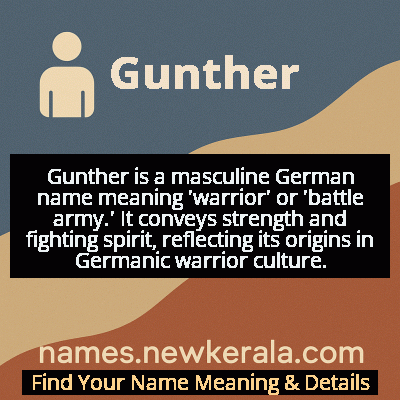Gunther Name Meaning & Details
Origin, Popularity, Numerology Analysis & Name Meaning of Gunther
Discover the origin, meaning, and cultural significance of the name GUNTHER. Delve into its historical roots and explore the lasting impact it has had on communities and traditions.
Name
Gunther
Gender
Male
Origin
German
Lucky Number
3
Meaning of the Name - Gunther
Gunther is a masculine German name meaning 'warrior' or 'battle army.' It conveys strength and fighting spirit, reflecting its origins in Germanic warrior culture.
Gunther - Complete Numerology Analysis
Your Numerology Number
Based on Pythagorean Numerology System
Ruling Planet
Jupiter
Positive Nature
Optimistic, inspirational, and creative.
Negative Traits
Scattered, exaggerating.
Lucky Colours
Yellow, gold, purple.
Lucky Days
Thursday.
Lucky Stones
Yellow sapphire.
Harmony Numbers
1, 2, 9.
Best Suited Professions
Arts, writing, communication.
What People Like About You
Creativity, optimism.
Famous People Named Gunther
Gunther of Cologne
Archbishop and Saint
Defended Cologne against Vikings and was canonized
Gunther von Hagens
Anatomist and Inventor
Created Body Worlds exhibition and plastination technique
Gunther Schuller
Composer and Musician
Pulitzer Prize winner who pioneered Third Stream music
Name Variations & International Equivalents
Click on blue names to explore their detailed meanings. Gray names with will be available soon.
Cultural & Historical Significance
Extended Personality Analysis
The name Gunther typically evokes associations with strength, reliability, and traditional masculine virtues. Those bearing this name are often perceived as natural leaders who approach life with seriousness and determination. The warrior roots of the name suggest someone who is protective of others and capable of handling difficult situations with courage and resolve. Gunthers are generally seen as practical individuals who value honesty and directness, sometimes appearing reserved but demonstrating deep loyalty once trust is established. Their personality is often characterized by a strong sense of responsibility and a preference for structured approaches to life's challenges. While they may not be the most emotionally expressive, their consistent reliability and steadfast nature make them valued friends and colleagues. The historical weight of the name contributes to expectations of dignity and competence in those who carry it.
Modern Usage & Popularity
In contemporary naming practices, Gunther maintains a niche but respected position, particularly in German-speaking regions where it's recognized as a traditional choice with historical depth. While its popularity has declined from mid-20th century levels, it continues to be selected by parents seeking strong, authentically Germanic names that convey stability and cultural heritage. Outside Germany and Austria, the name appears occasionally in families with German ancestry or among those appreciating its distinctive sound and historical resonance. The character Gunther from 'Friends' has given the name some international recognition, though this association has also made it somewhat humorous in English-speaking contexts. Current usage trends show Gunther as an uncommon but not rare choice, often selected by parents looking for traditional names that stand out from more popular contemporary options while maintaining cultural authenticity.
Symbolic & Spiritual Meanings
Symbolically, Gunther represents the enduring values of strength, protection, and cultural continuity. The name carries the weight of Germanic warrior tradition, symbolizing resilience in the face of adversity and the preservation of heritage across generations. Metaphorically, it suggests a bridge between ancient and modern worlds, embodying the translation of traditional virtues into contemporary contexts. Gunther symbolizes reliable leadership and the quiet strength that comes from deep-rooted confidence rather than ostentation. The name also represents cultural memory and the importance of maintaining connections to historical identity in an increasingly globalized world. In a broader sense, it stands for the masculine ideals of guardianship and responsibility—qualities that remain valuable despite evolving social norms and gender roles throughout history.

